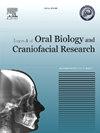在印度海得拉巴的成年人中,恢复力对未经治疗的龋齿的中介作用:一项横断面研究
Q1 Medicine
Journal of oral biology and craniofacial research
Pub Date : 2025-08-19
DOI:10.1016/j.jobcr.2025.08.017
引用次数: 0
摘要
弹性是一种与适应能力和压力管理相关的心理特征,已越来越被认为是健康结果的决定因素。然而,它在口腔健康中的作用,特别是对未经治疗的龋齿的作用,仍未得到充分探讨。本横断面研究考察了弹性对访问海德拉巴政府牙科医院的成年人中未经治疗的龋齿的中介作用。材料与方法对某公立牙科医院的成年患者进行了横断面研究。使用修订后的成人恢复力量表(ARM-R)评估恢复力,而使用世卫组织口腔健康评估表评估龋齿。采用结构方程模型(SEM)分析社会人口学因素和口腔健康行为在恢复力与未治疗龋病之间的中介作用。结果适应力与未治疗龋病呈显著负相关(p = 0.001),适应力水平较低的个体发生龋病的几率是未治疗个体的12倍。就业状况成为一个关键的中介因素(* * β = 0.30, p = * * *),较高的复原力水平与较好的就业结果有关,而就业结果又影响获得牙科保健的机会。此外,增加的刷牙频率被确定为另一个中介(β = 0.08, p = 0.02),这表明弹性更强的个体更有可能参与积极的口腔健康行为。结论心理韧性通过影响就业状况和口腔卫生习惯对口腔健康的保护作用,从而降低未治疗龋病的风险。这些结果强调了整合旨在增强口腔健康促进计划弹性的心理社会干预的必要性。本文章由计算机程序翻译,如有差异,请以英文原文为准。
Mediating effect of resilience on untreated dental caries among adults in Hyderabad, India: A cross-sectional study
Background
Resilience, a psychological trait associated with adaptability and stress management, has been increasingly recognized as a determinant of health outcomes. However, its role in oral health, particularly concerning untreated dental caries, remains under-explored. This cross-sectional study examines the mediating effect of resilience on untreated dental caries among adults visiting a Government Dental Hospital in Hyderabad.
Materials and method
A cross-sectional study was conducted among adult patients attending a government dental hospital. Resilience was assessed using the Adult Resilience Measure – Revised (ARM-R), while dental caries was evaluated using the WHO Oral Health Assessment Form. Structural Equation Modeling (SEM) was employed to analyze the mediating effects of sociodemographic factors and oral health behaviors in the relationship between resilience and untreated dental caries.
Results
A significant negative correlation was observed between resilience and untreated dental caries (p = 0.001), indicating that individuals with lower resilience levels had 12 times higher odds of developing dental caries. Employment status emerged as a key mediating factor (∗∗β = 0.30, p = ∗∗∗), with higher resilience levels being associated with better employment outcomes, which in turn influences access to dental care. Additionally, increased brushing frequency was identified as another mediator (β = 0.08, p = 0.02), suggesting that individuals with greater resilience are more likely to engage in positive oral health behaviors.
Conclusion
The findings highlight the protective role of resilience in oral health by influencing employment status and oral hygiene practices, thereby reducing the risk of untreated dental caries. These results underscore the need for integrating psycho-social interventions aimed at enhancing resilience in oral health promotion programs.
求助全文
通过发布文献求助,成功后即可免费获取论文全文。
去求助
来源期刊

Journal of oral biology and craniofacial research
Medicine-Otorhinolaryngology
CiteScore
4.90
自引率
0.00%
发文量
133
审稿时长
167 days
期刊介绍:
Journal of Oral Biology and Craniofacial Research (JOBCR)is the official journal of the Craniofacial Research Foundation (CRF). The journal aims to provide a common platform for both clinical and translational research and to promote interdisciplinary sciences in craniofacial region. JOBCR publishes content that includes diseases, injuries and defects in the head, neck, face, jaws and the hard and soft tissues of the mouth and jaws and face region; diagnosis and medical management of diseases specific to the orofacial tissues and of oral manifestations of systemic diseases; studies on identifying populations at risk of oral disease or in need of specific care, and comparing regional, environmental, social, and access similarities and differences in dental care between populations; diseases of the mouth and related structures like salivary glands, temporomandibular joints, facial muscles and perioral skin; biomedical engineering, tissue engineering and stem cells. The journal publishes reviews, commentaries, peer-reviewed original research articles, short communication, and case reports.
 求助内容:
求助内容: 应助结果提醒方式:
应助结果提醒方式:


